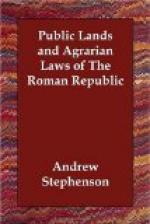It takes all the subsequent history of Rome to measure the consequences of the Revolution achieved by Licinius and Sextius; but the immediate working of their laws could have been nothing but a disappointment to their originators and upholders. We can tell little or nothing about the regard paid to the decemvirs. The priestly robes must have seemed an unprecedented honor to the plebeian. For some ten years the law regarding the consulship was observed, after which time it was occasionally[23] violated, but can still be called a success. The laws[24] of relief, as may be supposed of all such sumptuary enactments, were violated from the first. No general recovery of the public land from those occupying more than five hundred[25] jugera ever took place. Consequently there was no general division of land among the lackland class. Conflicting claims and jealousy on the part of the poor must have done much to embarrass and prevent the execution of the law. No system of land survey to distinguish between ager publicus and ager privatus existed. Licinius Stolo himself was afterwards convicted of violating his own law.[26] The law respecting debts met with much the same obstacles. The causes of embarrassment and poverty being much the same and undisturbed, soon reproduced the effects which no reduction of interest or installment of principal could effectually remove. It is not our intention, however, to express any doubt that the enactments of Licinius, such as they were, might and did benefit the small farmer and the day laborer.[27] Many were benefited. In the period immediately following the passing of the law, the authorities watched with some interest and strictness over the observance of its rules and frequently condemned the possessors of large herds and occupiers of public domain to heavy fines.[28] But in the main the rich still grew richer and the poor and mean, poorer and more contemptible. Such was ever the liberty of the Roman. For the mean and the poor there was no means of retrieving their poverty and degradation.
These laws, then, had little or no effect upon the domain question or the re-distribution of land. They did not fulfil the evident expectation of their author in uniting the plebeians into one political body. This was impossible. What they did do was to break up and practically abolish the patriciate.[29] Henceforth were the Roman people divided into rich and poor only.
[Footnote 1: Livy, VI, 34.]
[Footnote 2: Livy, VI, 35: “unam de aere alieno, ut deduco eo de capite, quod usuris pernumeratum esset, id, quod superesset, triennio aequis portionibus persolveretur.”]
[Footnote 3: Livy, VI, 35; Niebuhr, III, p.16; Varro, De R.R., 1: “Nam Stolonis illa lex, quae vetat plus D jugera habere civem Romanorum.” Livy, VI, 35: “alteram de modo agrorum, ne quis plus quingenta jugera agri posideret.” Marquardt u. Momm., Roem. Alterthuemer, IV, S. 102.]




